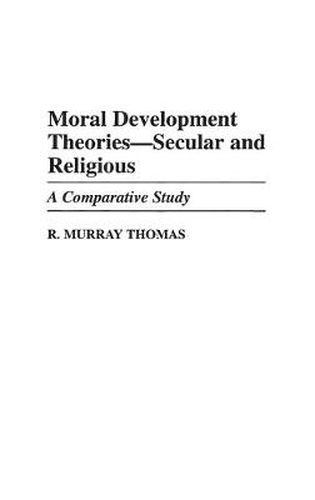Readings Newsletter
Become a Readings Member to make your shopping experience even easier.
Sign in or sign up for free!
You’re not far away from qualifying for FREE standard shipping within Australia
You’ve qualified for FREE standard shipping within Australia
The cart is loading…






Moral Development Theories-Secular and Religious introduces readers to 13 secular models and 13d religious theories in a wide-ranging comparative study of the roots of moral development. The secular models include attribution theory, cognitive-structural views, social-learning and social-cognition approaches, Freud’s psychoanalysis (plus Erikson and Fromm), Marxist beliefs, a composite theory, Hoffman’s conception of empathy, Anderson’s information-integration view, Gilligan’s gender distinction, Sutherland and Cressey’s explanation of delinquency, and Lovinger on ego development. Religious theories represent the Judaic-Christian-Islamic line, Hinduism and derivatives (Buddhism, Jainism, Sikhism), Confucianism, Shinto, and four minor theories drawn from the belief systems of the Navajo, Zulus, Vodou adherents, and Okinawans.
The description of each theory is designed to answer a common set of questions introduced in Chapter 1. The closing section of each chapter evaluates that chapter’s theories in terms of a series of assessment standards described in Chapter 2. The book’s final chapter inspects all of the theories from the viewpoint of five desires that people often hold in relation to their conceptions of moral development. The desires are: (a) for immanent justice; (b) to understand the causes of the consequences that result from people’s behavior in moral situations; © to become immortal; (d) to enjoy a happy life, and (e) to understand the moral-development process in order to help others who need moral guidance.
$9.00 standard shipping within Australia
FREE standard shipping within Australia for orders over $100.00
Express & International shipping calculated at checkout
Moral Development Theories-Secular and Religious introduces readers to 13 secular models and 13d religious theories in a wide-ranging comparative study of the roots of moral development. The secular models include attribution theory, cognitive-structural views, social-learning and social-cognition approaches, Freud’s psychoanalysis (plus Erikson and Fromm), Marxist beliefs, a composite theory, Hoffman’s conception of empathy, Anderson’s information-integration view, Gilligan’s gender distinction, Sutherland and Cressey’s explanation of delinquency, and Lovinger on ego development. Religious theories represent the Judaic-Christian-Islamic line, Hinduism and derivatives (Buddhism, Jainism, Sikhism), Confucianism, Shinto, and four minor theories drawn from the belief systems of the Navajo, Zulus, Vodou adherents, and Okinawans.
The description of each theory is designed to answer a common set of questions introduced in Chapter 1. The closing section of each chapter evaluates that chapter’s theories in terms of a series of assessment standards described in Chapter 2. The book’s final chapter inspects all of the theories from the viewpoint of five desires that people often hold in relation to their conceptions of moral development. The desires are: (a) for immanent justice; (b) to understand the causes of the consequences that result from people’s behavior in moral situations; © to become immortal; (d) to enjoy a happy life, and (e) to understand the moral-development process in order to help others who need moral guidance.